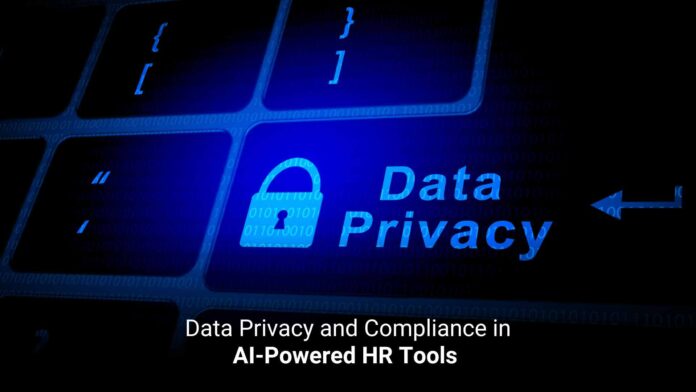The AI dashboard predicts employee turnover for an HR manager, recommends learning paths, and shortlists candidates. But a data breach exposes sensitive employee information, raising questions about how the system handles personal data. This is a growing concern because AI has now become an integral part of HR operations.
Each AI model learns from performance reviews, communication, and other employee data. It increases the efficiency of processes but raises some ethical concerns: How is the employee data being collected, treated, and stored? Who is the recipient of this data? Most importantly, to what extent will these systems be fully compliant with the law on data protection?
This article explains the importance of data privacy and compliance with AI-powered HR tools.
Types of Employee Data Processed by AI
Following are the major types of employee data processed in AI-powered HR Tools:
- Identifying Information
AI systems collect and process employee information: name, contact details, date of birth, and employee IDs. Data such as this is integrated across various platforms to create unified employee profiles. For example, a SaaS firm may employ AI for candidate data matching across different regions while ensuring compliance.
- Recruitment Data
AI recruitment tools match top candidates based on their resumes, social profiles, and assessment results. A company might score applicants by skills alignment and cultural fit using predictive algorithms. This does accelerate hiring, but AI Compliance requires algorithms to remain transparent and unbiased.
- Performance Data
Monitoring performance metrics, project outcomes, and collaboration patterns are all capabilities of AI HR Tools. For instance, using AI analytics, a service provider can review the productivity of a team leveraging project management information. The leadership challenge will be in ensuring that such monitoring does not breach Data Privacy.
- Engagement Data
AI tools analyze data from employee surveys, communication platforms, and engagement apps to measure sentiment. In a consulting firm, for instance, it could involve internal chat data analysis to identify potential risks for burnout. HR needs to ensure this data is anonymized and dealt with ethically to sustain trust and comply with regulations.
- Learning and Development Data
AI systems tailor training to skill gaps and performance data. For example, a technology company might apply AI to recommend upskilling courses for engineers. However, AI Compliance requires transparency regarding how employee learning data influences performance appraisals.
Why Data Privacy Is Critical in HRTech
Here’s why Data Privacy is critical in modern HRTech.
- Safeguarding Employee Information
AI HR platforms deal with sensitive information, like compensation details, health information, and behavioral metrics. In an IT services firm, for example, an AI HR tool might analyze work patterns to predict productivity. Should the insights not be protected through Data Privacy, such information risks being exposed to unscrupulous access and causing damage.
- Develops Employee Trust
When employees know their data is used ethically, trust in the organization strengthens. In a SaaS organization, if AI systems are used for performance monitoring, having policies around what data is tracked and why instills confidence. It becomes a competitive advantage in talent retention.
- Reduces Legal and Financial Risks
Data breaches result in heavy fines, lawsuits, and loss of credibility. For example, if an AI-powered hiring tool leaks candidate data, it also causes damage to the employer’s reputation. Data Privacy means risk management and resilience.
- Supports Ethical AI Governance
It means that AI algorithms should work in a transparent and non-discriminatory manner. A consulting firm embracing AI Analytics for workforce optimization should have models with frameworks related to AI Compliance that keep up the fairness.
Future of AI and Data Privacy in HR
Below are the emerging trends defining the future of AI and data privacy in HR.
- Ethical AI Will Be a Priority
Ethical AI will be implemented within corporate governance. C-suite leaders will request explainable AI-powered HR Tools that explain how decisions such as who gets hired and why
have arrived at. For example, a consultancy that uses AI to evaluate employees will have to ensure that their algorithms are free from bias. Ethical AI will be integrated into sustainability and DEI initiatives.
- Privacy will be Standard Practice
In all, future HR systems will collect just the very essential personal information. Data Privacy will be applied to candidate sourcing, from engineering to exit interviews. For instance, a global firm may implement privacy in its HR software to ensure compliance across multiple jurisdictions.
- Data Protection Regulations Will Drive Compliance Innovation
With the continuous evolution in data privacy regulations, AI compliance will become a differentiator for HRTech. Vendors offering built-in compliance features will dominate the adoption. Organizations operating across the EU, US, and APAC will seek HR platforms that adapt dynamically to local privacy mandates.
- Predictive Analytics Will Demand Governance
AI-driven HR tools will predict workforce trends to optimize productivity. For instance, a SaaS company can use predictive analytics to determine which talents are at risk and ensure early intervention. But with implementation comes the risk of overreach, and organizations will have to implement strict governance frameworks to avoid misuse.
- Employee Empowerment by Data Control
There will also be expectations on the part of employees about their control over the use of their data. HR systems will provide employee dashboards showing what data is collected, how that data is processed, and what it is used for. For example, an IT services company might provide opt-in or opt-out options for analytics.
- Secure AI Infrastructure Will Be Non-Negotiable
Advanced encryption, multi-factor authentication, and continuous monitoring through AI will become integral features of the next generation of HR Tools. Only organizations that invest in secure infrastructures will safeguard data and maintain a strong brand reputation.
Conclusion
It is in the balance between innovation and responsibility that the future of HR lies. In a world where AI will continue to reshape workforce dynamics, data privacy will become the lynchpin for sustainable transformation. You must champion responsible AI adoption to protect both people and performance.
Paramita Patra is a content writer and strategist with over five years of experience in crafting articles, social media, and thought leadership content. Before content, she spent five years across BFSI and marketing agencies, giving her a blend of industry knowledge and audience-centric storytelling.
When she’s not researching market trends , you’ll find her travelling or reading a good book with strong coffee. She believes the best insights often come from stepping out, whether that’s 10,000 kilometers away or between the pages of a novel.







